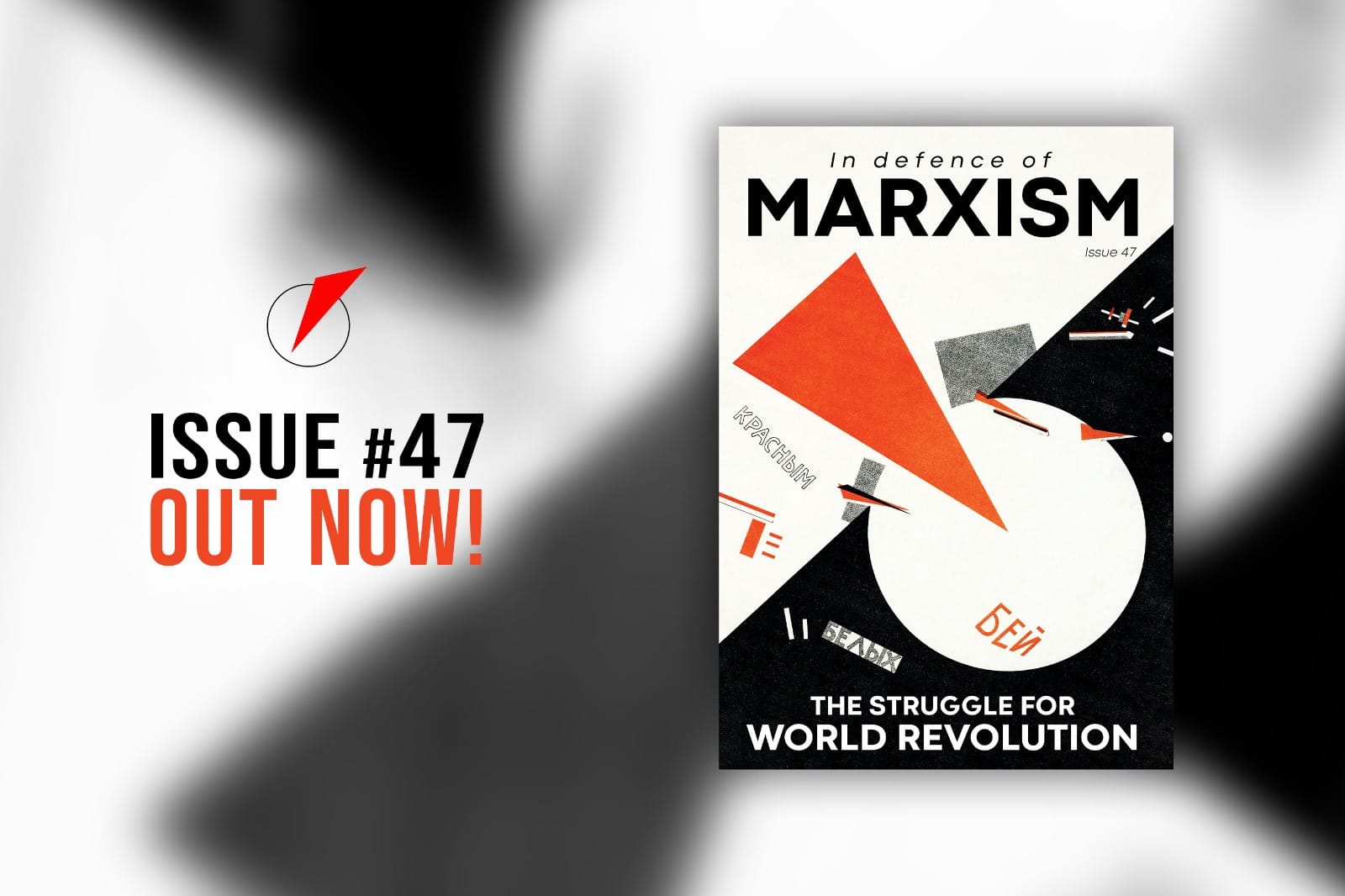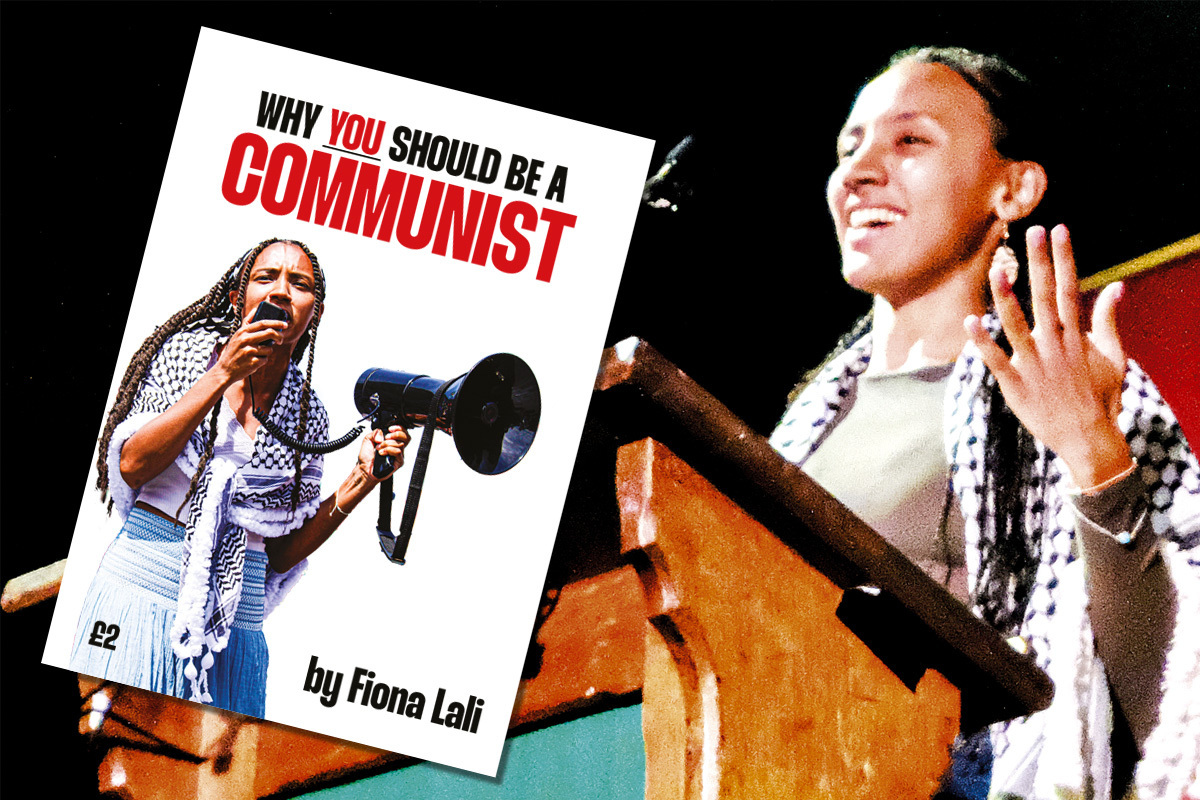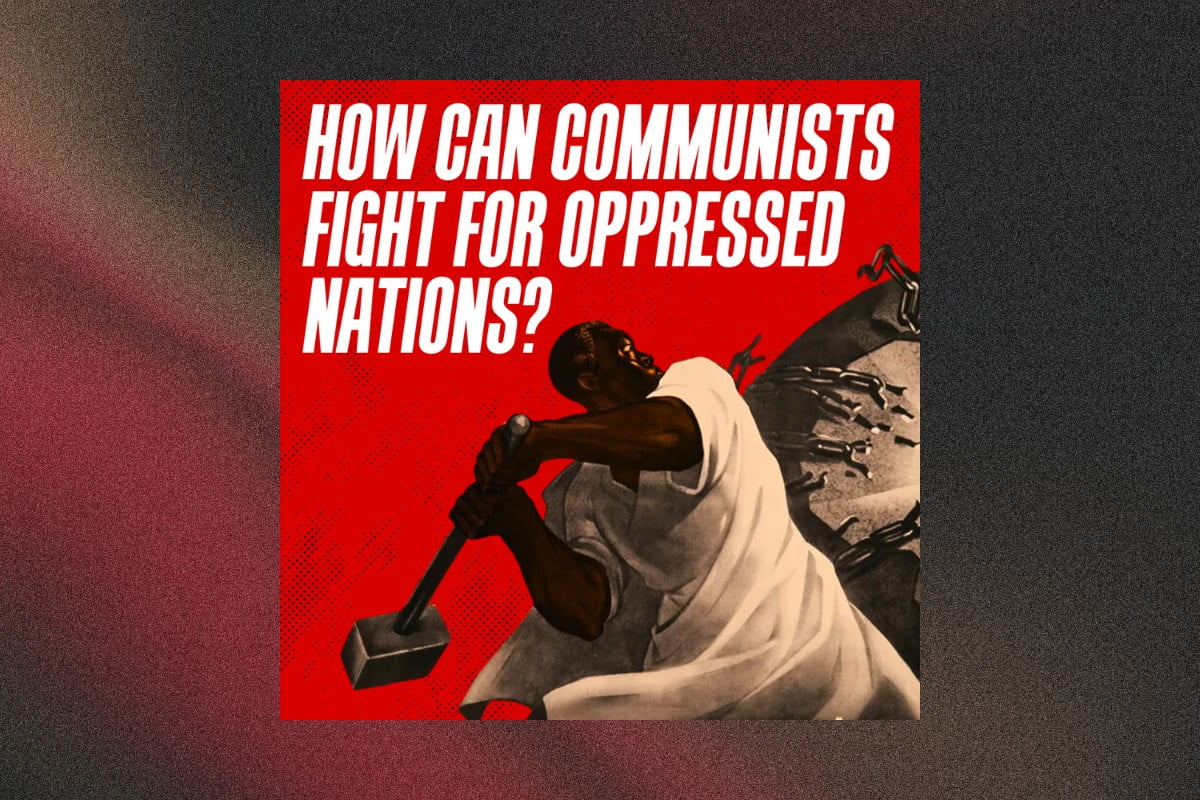Issue 47 of In Defence of Marxism magazine – the quarterly theoretical journal of the Revolutionary Communist International – is out now!
We publish here Alan Woods’ editorial for this issue, in which he traces the lessons of the international communist movement from the times of Marx and Engels to today, and the revolutionary tradition of struggle against militarism, imperialism and war, which communists continue down to the present.
Get your copy of issue 47 of In Defence of Marxism magazine now!
View this post on Instagram
A key theme of the current issue is internationalism. We are publishing an important article by Fred Weston about how the Communist International was built. It is very important that our young comrades should understand who we are and where we come from. The history of our movement is very rich in lessons, and it deserves careful study.
Our International, the Revolutionary Communist International (RCI) – is both very young and very old. Ideologically, we can trace our history right back to The Communist Manifesto. Although it was written as long ago as 1848, in all essentials it retains its full validity today.
And through the work of Ted Grant, the veteran Trotskyist and founder of our movement, we can trace our history right back to the origins of the International Left Opposition in the early 1930s.
Whoever wishes to understand the present crisis of capitalism must therefore return to the ideas of Marx, Engels, Lenin and Trotsky – the firm ideological base on which our International was built and which we unconditionally defend.
Marxism is internationalism
It is no accident that Marx and Engels stated in the Communist Manifesto that internationalism is one of the main things that distinguishes communists, and that
“… in the national struggles of the proletarians of the different countries, they point out and bring to the front the common interests of the entire proletariat, independently of all nationality.”
While combating all forms of discrimination, inequality and oppression, we stand for the sacred unity of the working class and combat implacably every attempt to divide the workers’ movement on lines of nationality, language, religion, gender or race.
This internationalism of Marx and Engels was not the product of sentimental considerations; it flowed from the fact that capitalism develops as a world system. Out of the different national economies and markets there arises one single, indivisible and interdependent whole – the world market.
Today the crushing domination of the world market is the most decisive fact of our epoch. Not a single country, no matter how big and powerful – not the United States, not China, not Russia – can stand apart from its mighty pull.
Marxism and war
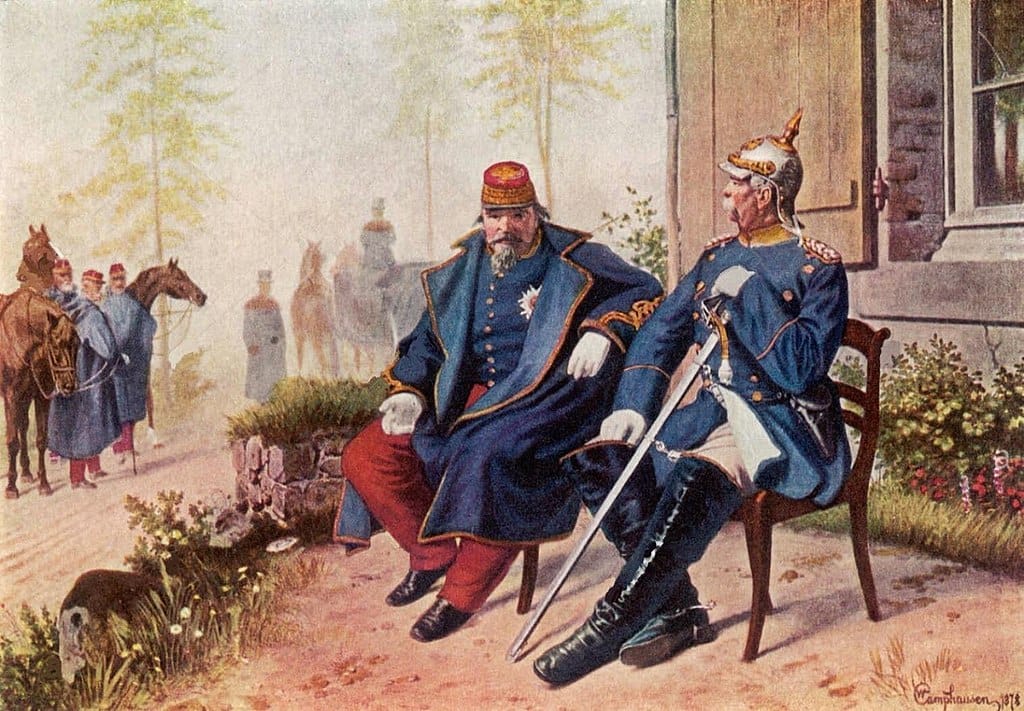
The need for proletarian internationalism is not diminished during periods of war. On the contrary, it is at its greatest when the war drums are beating and the ruling classes seek to stupefy the workers of their own countries with the poison of national hatred.
This is something that Marx and Engels always understood. Following the defeat of Napoleon III by Bismarck in the Franco-Prussian War, the entirety of the ‘respectable’ German press was filled with bloodthirsty calls for heavy reparations and the annexation of French territory. After all, hadn’t France started the war?
The German section of Marx and Engels’ international, the International Working Men’s Association, stood alone in condemning the invasion of the new French Republic, and held out a hand of friendship and solidarity to the workers of France:
“… the German workmen will not patiently tolerate the annexation of Alsace and Lorraine […] We shall faithfully stand by our fellow workmen in all countries for the common international cause of the proletariat!”
And when German troops were used to assist the French ruling class in crushing the Paris Commune in May 1871, Marx issued the following clarion call of proletarian internationalism:
“That, after the most tremendous war of modern times, the conquering and the conquered hosts should fraternise for the common massacre of the proletariat – this unparalleled event does indicate, not, as Bismarck thinks, the final repression of a new society upheaving, but the crumbling into dust of bourgeois society. The highest heroic effort of which old society is still capable is national war; and this is now proved to be a mere governmental humbug, intended to defer the struggle of classes, and to be thrown aside as soon as that class struggle bursts out into civil war. Class rule is no longer able to disguise itself in a national uniform; the national governments are one as against the proletariat!”
Lenin and the Third International
With remarkable insight, Marx had predicted as far back as 1870 that the annexation of Alsace-Lorraine by what would become the German Empire would make another war inevitable, but this time on an even more horrifying scale.

That war eventually broke out in the summer of 1914. Millions of workers and peasants were thrown into the industrial slaughterhouse of the First World War to redivide the world between the imperialist powers.
At this pivotal moment, the leaders of the so-called ‘Socialist’ International abandoned the internationalist principles to which they paid lip service, abandoned the world working class, and supported their own national ruling classes with only two exceptions – the Serbian and Russian parties. Overnight, the international organisations of the working class effectively ceased to exist.
Karl Kautsky, the leading theoretician of German Social Democracy at the time, announced his complete abandonment of Marxism and internationalism when he tried to justify this betrayal, arguing that “the International cannot be an effective instrument in time of war: it is essentially a peacetime instrument”.
The Second (Socialist) International was dead. Already in 1914, Lenin drew the necessary conclusions and proclaimed the need for a new Third International. The possibility of building this international on a mass scale was provided by the revolutionary wave that swept Europe after the Russian workers seized power in 1917.
Degeneration
The launching of the Third (Communist) International was a beacon of hope for the whole of humanity. In contrast to the endless horror and misery promised by capitalism, and the hypocrisy of the reformists, the Third International offered a new, socialist world.
But the enormous potential of the Third International was tragically squandered by the rise of Stalinism in the Soviet Union, which played havoc with the still immature leaderships of the Communist Parties abroad.
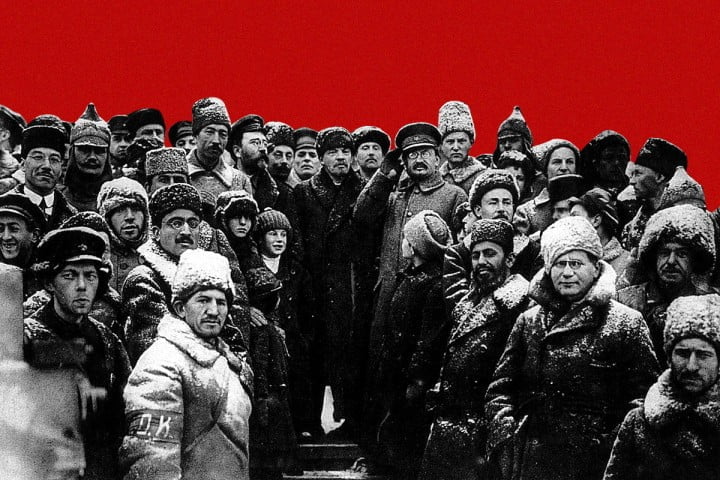
Whereas Lenin and Trotsky looked to the world socialist revolution as the only safeguard for the future of the Russian Revolution and the Soviet Union, Stalin and his supporters turned their focus inward, with the so-called theory of ‘socialism in one country’.
As Niklas Albin Svensson explains in his article in the present issue, the thoroughly anti-Marxist idea that socialism could be built within the confines of a single state expressed the national limitedness of the outlook of the bureaucracy, which looked on the Communist International (‘Comintern’) merely as an instrument of the foreign policy of Moscow.
The worst result of this degeneration was in Germany. Trotsky called for a united front of Communist and Social-Democratic workers to fight the Nazi menace. But the warnings of Trotsky to the members of the Communist Party fell on deaf ears. Instead, the German working class was split down the middle. The Comintern’s insane policy of ‘social fascism’, which described fascism and Social Democracy as ‘twin brothers’, split and paralysed the powerful German labour movement, allowing Hitler to come to power in 1933.
The defeat of the German working class in 1933 was a dramatic turning-point. Trotsky drew the conclusion that an international which was incapable of reacting in the face of such a defeat was dead, and a new revolutionary international needed to be forged. History proved him right.
In 1943, having been cynically used by Stalin as an instrument of Moscow’s foreign policy, the Communist International was ignominiously dissolved, without even the pretence of a congress. The political and organisational heritage of Lenin was dealt a heavy blow for a whole historical period.
The Fourth International
Under the most difficult conditions in exile, slandered by the Stalinists and persecuted by the GPU, Trotsky attempted to regroup the small forces that remained loyal to the traditions of Bolshevism and the October Revolution in the International Left Opposition.
Unfortunately, in addition to the smallness of their forces, many of the adherents of the Opposition were confused and disoriented, and many mistakes were made, particularly of a sectarian character. This reflected in part the isolation of the Trotskyists from the mass movement.
Trotsky wrote in ‘Sectarianism, Centrism and the Fourth International’:
“As a matter of fact, into the ranks of the Bolshevik-Leninists during the initial stages came a considerable number of anarchistic and individualistic elements generally incapable of organisational discipline, and occasionally an incompetent, who could not make his career in the Comintern. These elements viewed the struggle against ‘bureaucratism’ in approximately the following manner: no decisions must ever be arrived at; instead, ‘discussion’ is to be installed as a permanent occupation. We can say with complete justification that the Bolshevik-Leninists showed a good deal of patience – perhaps even a good deal too much – towards such types of individuals and grouplets. Only since an international core has been consolidated, and has begun to assist the national sections in purging their ranks of internal sabotage, has actual and systematic growth of our organisation begun.”
He added:
“… in the wake of great convulsions, the only organisations that will be able to survive and develop are those that have not only cleansed their ranks of sectarianism but have also systematically trained them in the spirit of despising all ideological vacillation and cowardice.”
The murder of Trotsky by one of Stalin’s assassins in 1940 struck a mortal blow against the movement.
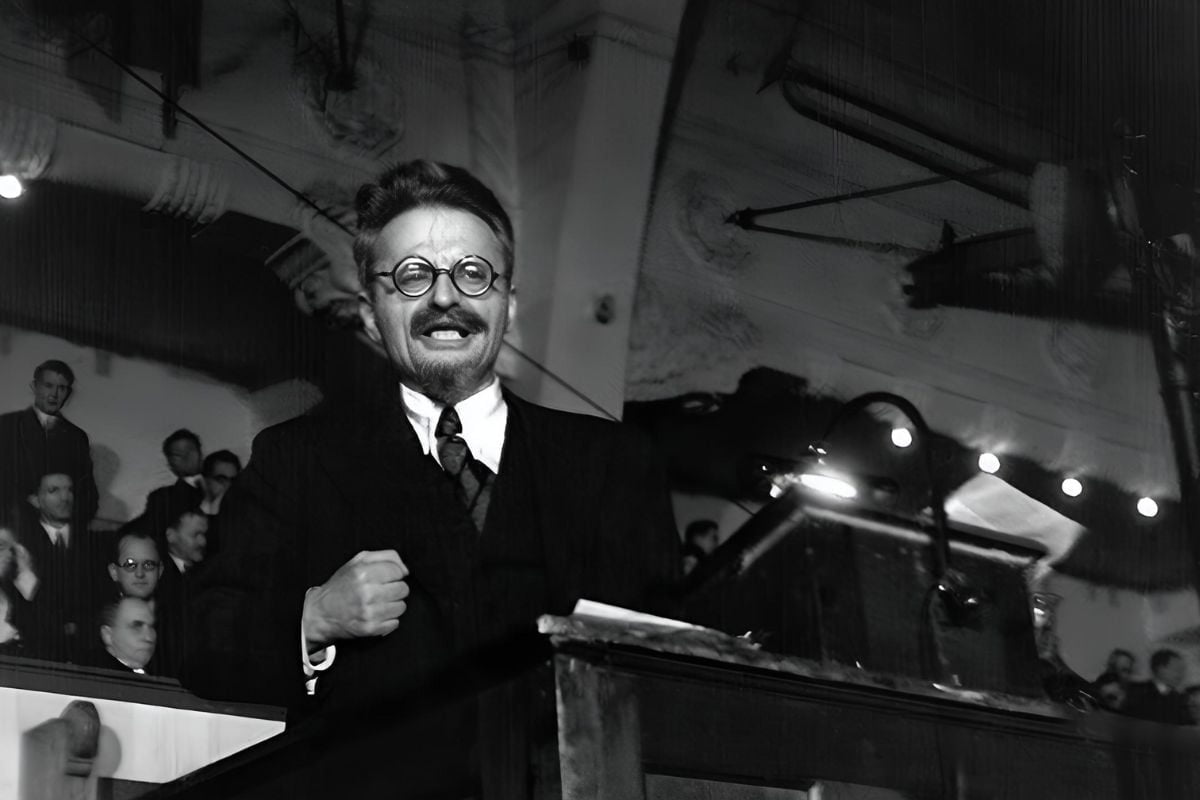
The degeneration and collapse of the Fourth International after Trotsky’s death was, in part, due to objective factors. The mighty economic upswing of world capitalism, and the renewed illusions in reformism and Stalinism, meant that for a whole period the forces of genuine Marxism could not expect big gains.
However, the failure of the leaders of the Fourth – Pablo, Cannon, Mandel, Frank and co. – to comprehend the changes in the objective situation played a fatal role in the destruction of the International.
This sectarianism is present today in most of the groups that claim to represent Trotskyism, but have failed to grasp the most elementary ideas that Trotsky defended.
The real traditions of Trotskyism were kept alive by comrade Ted Grant and the other leaders of the British section, which soon came into conflict with the leadership of the so-called Fourth.
Today, the Revolutionary Communist International is the proud inheritor of the unbroken thread that our tendency can trace through the work of Ted Grant, from Trotsky’s International Left Opposition in the early years of the Communist International, right back to The Communist Manifesto and the First International.
This is our banner, our tradition and our heritage. Its ideas provide us with an indestructible foundation. And this is the guarantee of the future success of our International.
Inter-imperialist rivalry
The need for a revolutionary international, standing on the genuine principles of Marxism has never been more necessary.
The deep crisis of the capitalist system worldwide, and the relative decline of US imperialism – formerly the sole, undisputed world power – is resulting in a new period of instability, inter-imperialist rivalry, and war.
In 1987, US President Ronald Reagan and Soviet leader Mikhail Gorbachev signed the Intermediate-Range Nuclear Forces (INF) Treaty, which required the United States and the Soviet Union to permanently eliminate all of their nuclear and conventional ground-launched ballistic and cruise missiles with ranges of 500 to 5,500 kilometres.
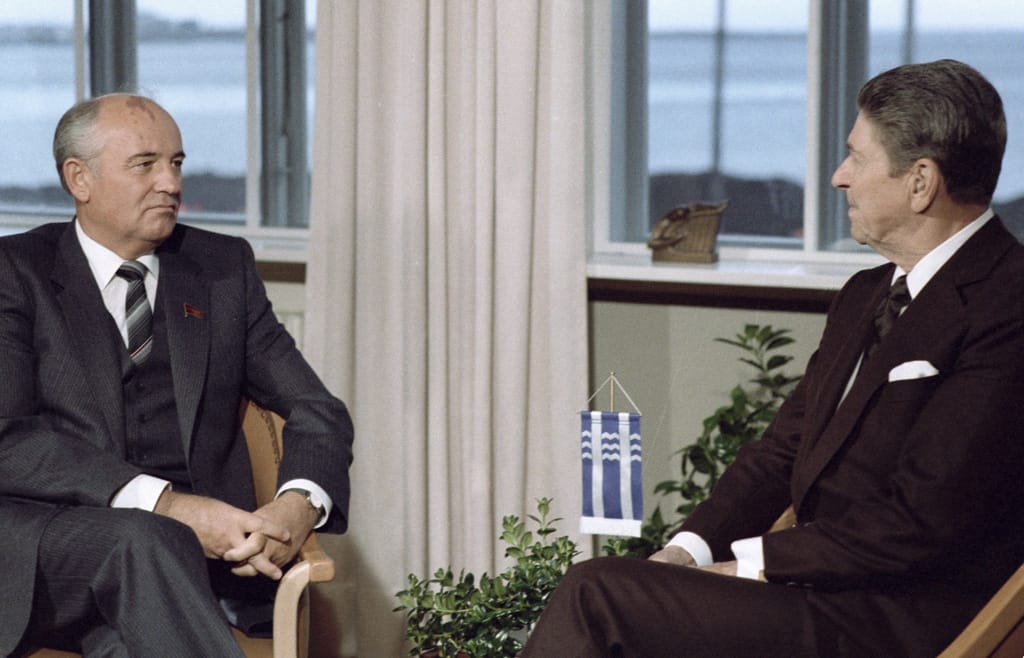
The US finally pulled out of the treaty in 2019, and Russia inevitably followed suit. A new round of the arms race has followed, as night follows day.
On 10 July, during NATO’s 75th anniversary summit in Washington, D.C., the US and German governments announced a plan to deploy US long-range missiles in Germany by 2026. For the first time since the Cold War, long-range US missiles are to be deployed in Germany.
According to the German Defence Minister, Boris Pistorius, the ‘temporary’ deployment of US weapons would give NATO allies the time to prepare: “We are talking here about an increasingly serious gap in capability in Europe.” Prepare for what, exactly? Mr Pistorius did not say. But we can hazard a shrewd guess.
Evidently, he was referring to the coming Armageddon between Russia and the West – a glorious conflagration in which the Sacred Values of Western Democracy would be confirmed within the space of approximately four minutes in a most splendid display of fireworks, from which, unfortunately, very few people would emerge alive.
This, from any rational point of view, is a most peculiar way of defending the European people! In fact, it leads one to ask whether they ought to be defended, not against the Russians, but against their allies in NATO!
Feeble response
One might have expected a chorus of indignant opposition to this lunacy, particularly from the Greens, who were extremely vocal in their opposition to the stationing of US long-range missiles in Germany in the 1980s.
But now the Greens have become ‘respectable’. They have taken their seats in Olaf Scholz’s ruling coalition. And they have loyally backed his disastrous policy in Ukraine, following the dictates of Washington in a most servile manner.
These cowardly petty bourgeois have enthusiastically jumped onto the warmongers’ battle wagon, especially on the question of Ukraine. In fact, on this issue, there is little to distinguish them from the arch-warmonger Pistorius.
That is to say nothing of the so-called ‘Communist’ Parties in France and Spain, who issue hypocritical statements for ‘peace’ and a ‘diplomatic solution’ while in practice supporting the funnelling of arms and military aid to Ukraine.
Such is the fate of all brands of reformism in the present epoch.
Fight imperialism
It is the duty of communists everywhere to expose the lies and crimes of the imperialists in all countries, and offer a genuine internationalist alternative to the hypocritical phrases of the reformist so-called ‘left’.
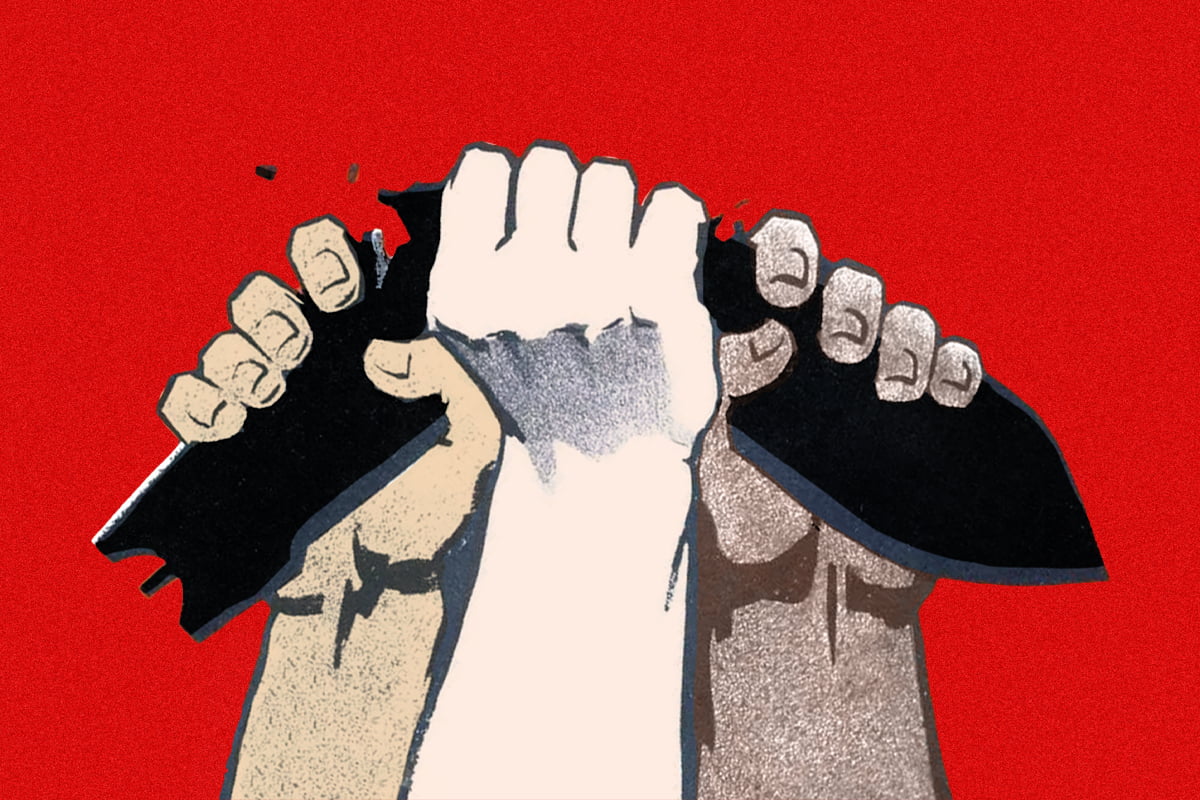
It is for precisely this reason why the Revolutionary Communist International has launched its ‘Books Not Bombs’ campaign in the summer. We appeal to anyone serious about fighting imperialism to get involved.
But to finally defeat imperialism we must get organised, and build a world party of proletarian revolution. This is the task that the Revolutionary Communist International has set itself. Join us – the time is now!
Down with the warmongers!
Fight for the expropriation of the bankers and capitalists whose avaricious greed for profit is a constant cause of wars and crises!
For a socialist world that will be free from the scourge of poverty, exploitation, wars, and oppression!
The only just war is the class war!

